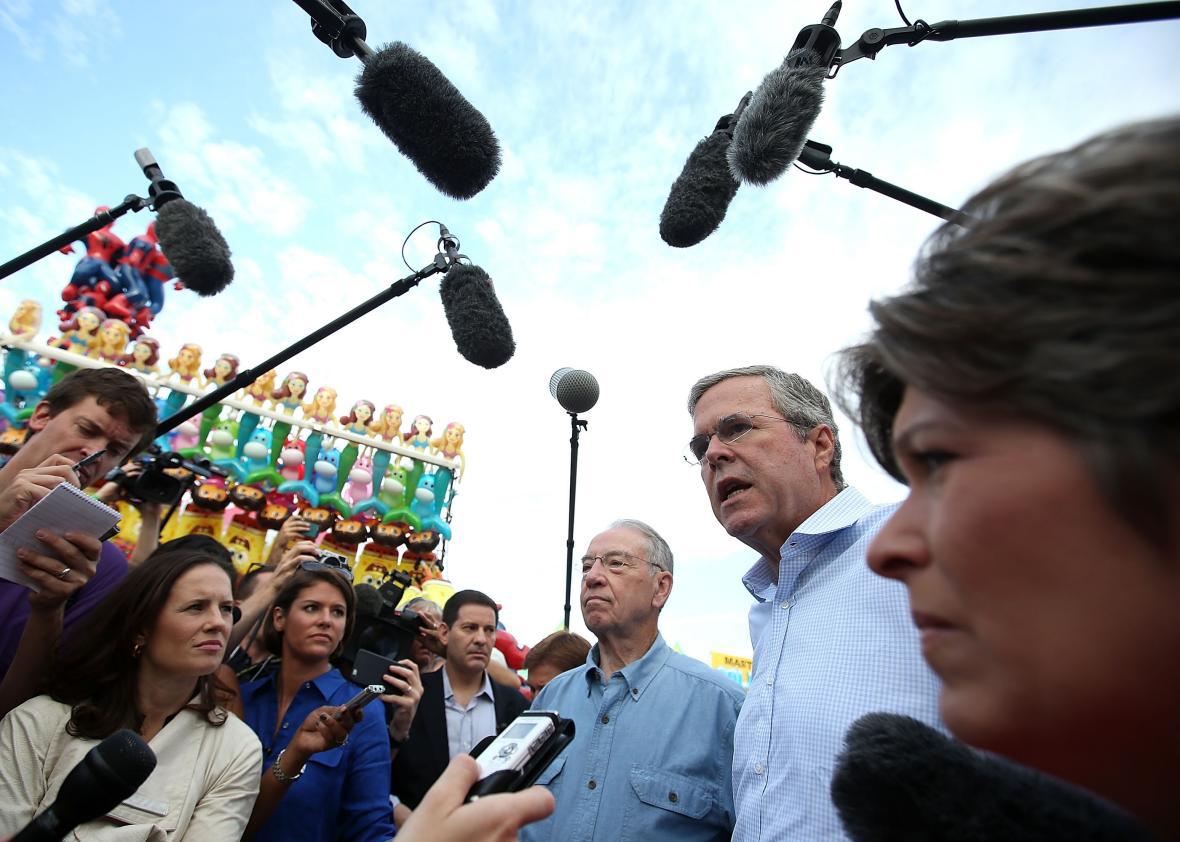Jeb Bush has found his political spirit animal and his name is John McCain.
In recent weeks, as his campaign has flailed, Bush has taken to telling the story of the time he crossed paths with McCain at an airport during the 2008 presidential primary campaign. “He’s carrying his bag, he has no aide, he’s running for president, he has no staff,” Jeb said in New Hampshire last month. “The campaign was basically over. Everybody said it. All the pundits said, ‘It’s over; why waste your time?’”
It’s easy to see why Jeb’s grown fond of reciting this story. His trip down memory lane serves as a helpful reminder that for all the attention we pay to the latest polls, we shouldn’t mistake surveys for a crystal ball. On this date eight years ago, after all, eventual nominee John McCain was looking up at both Rudy Giuliani and Fred Thompson. A lot can—and will—happen between now and when Iowa and New Hampshire kickoff the nominating contest in early 2016. Bush is hoping a nervous-and-getting-more-so GOP establishment connects the dots between his struggles and those of the man who ultimately won the party’s nomination in 2008. Already some pundits are buying what he’s selling, probably because you don’t have to squint too hard to see the similarities:
- Both McCain and Bush entered as the de facto favorite for their party’s nomination. (McCain earned that status thanks to his second-place finish in the 2000 GOP primary; Jeb’s expectations were the result of his last name and the millions in fundraising dollars that came with it.)
- Both faced a challenge in the establishment lane from a younger, more telegenic establishment candidate (Romney in McCain’s case; Marco Rubio in Bush’s).
- Both sputtered out of the gates and were passed by less likely GOP hopefuls (Giuliani and Thompson in 2007; Trump and Carson in 2015).
- Both were forced to restructure their campaigns after burning through campaign cash at an alarming rate—news of which prompted plenty of speculation among the chattering class that their once-promising candidacies were on life support.
There is, though, one major flaw in Bush’s chosen analogy: For all the doomsaying about McCain’s campaign, the Arizona senator had a polling floor of about 15 percent nationally in 2007. In the nearly 150 national polls tracked by RealClearPolitics from the start of that year through the end of October of that year, McCain failed to crack double digits only six times, and never more than twice in a month. Bush, meanwhile, hasn’t averaged above 15 percent since mid-July, and has inched into double digits only once in the past 12 national polls dating back to mid-September.
That doesn’t mean a Jeb resurgence is impossible—particularly given he still has Marco Rubio within his sights in the establishment lane, which many still expect will produce the eventual nominee. It does, however, mean that Bush faces a steeper hill to climb than McCain did. The bigger problem with Jeb’s sales pitch, though, is that donning a McCain mask for Halloween is unlikely to win over the GOP’s right wing, which was never a fan of the Arizona senator in the first place, nor will it give his establishment friends warm and fuzzy memories. McCain, after all, pulled out a win in the Republican primary—but he went on to lose to Barack Obama that November.
Elsewhere in Slate: Marco Rubio May Be Having a “Moment,” But He’s Showing No Signs of Actual Momentum
